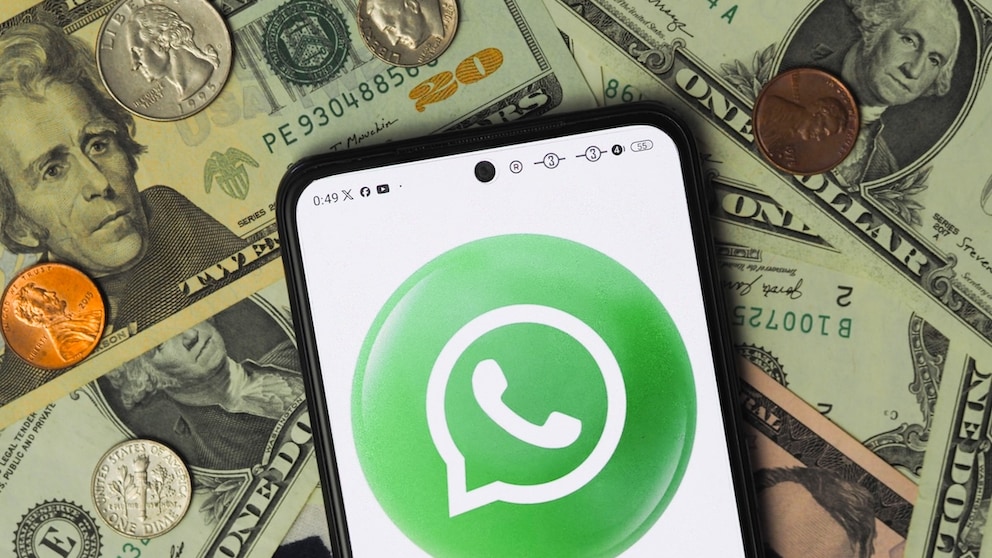April 22, 2025, 9:14 am | Read time: 5 minutes
How does Meta earn money with WhatsApp? After all, the popular messenger is free to use. TECHBOOK has investigated.
Older generations may recall a time when WhatsApp charged an annual subscription fee of 89 cents or one US dollar, which occurred between 2013 and 2016. A lot has happened in this period. In 2014, Facebook (now Meta) bought the messenger app for a total of 22 billion US dollars. Today, almost three billion people use WhatsApp—for free. But how does WhatsApp actually earn money?
Can WhatsApp Earn Money Without Advertising?
At first glance, one might think that Meta covers all the operational costs for WhatsApp. After all, the company and its top boss, Mark Zuckerberg, also get something out of it. A whole lot of data. Who is writing to whom about what?
It certainly helps the WhatsApp brand to have such a large financial backer in the background. However, over time, Meta would not be able to sustain itself with an endlessly open wallet. So far, WhatsApp has refrained from displaying ads so as not to disrupt the user experience.
WhatsApp Channels: A First Compromise
After the Facebook takeover, there were rumors that the new owner was planning to display advertising on WhatsApp. However, this has not yet happened. Will it stay that way forever? We’ll have to wait and see.
The new WhatsApp “News” or “Channels” section is a kind of compromise. Media, companies and other organizations can post information here. The whole thing fits harmoniously into the familiar WhatsApp world and doesn’t look like advertising, at least at first glance. However, this is precisely what it represents—a subtle form of advertising. At the same time, it is also Meta’s recognizable attempt to transform WhatsApp into a social media platform. More on this later.
WhatsApp Business for Companies
Meta has found another way to use WhatsApp not only to generate costs, but also to earn money. Since 2018, the WhatsApp Business app has been available to businesses. It is aimed at small and medium-sized companies. For larger companies with a higher communication volume, there is an entire WhatsApp Business platform.
This platform includes interfaces for sending automated messages, managing customer support via Messenger, and distributing service information. Companies have to pay for this, regardless of whether they only use the business app or the entire WhatsApp package.
Pricing for the WhatsApp Business Platform
On a separate subpage, Meta informs companies about the prices of its business platform and the various ways in which they are charged. Basically, fees are charged for interactions with customers. A distinction is made between the following categories:
- Marketing: This includes, for example, announcements about new products, services, functions or promotions.
- Utility: These are actions that follow on from customer inquiries or actions. This includes, for example, opt-in confirmations or update notifications for the user account or an order.
- Authentication: Allows the user to be authenticated, for example by sending one-time passwords.
- Service: These interactions are there to resolve customer concerns.
The current prices are listed in a download table. Meta does not list any prices for “Authentication-International” and “Service” (as of March 28, 2025). For the other categories, the prices for Germany are as follows:
- Marketing: 0.1131 Euro
- Utility: 0.0456 Euro
- Authentication: 0.0636 euros
However, the company has already announced that it will revise the pricing model on July 1, 2025.
The Global Reach of WhatsApp Business
It is not entirely clear whether WhatsApp Business is profitable for Meta. However, the fact is that, according to figures from Statista, there was a sharp increase in active users of the platform between 2020 and 2023. Five years ago, there were around 50 million users, but by 2023 this figure had risen to 200 million. According to estimates, the company earned an average of 0.25 US dollars per customer worldwide. In 2023, global revenue for WhatsApp Business is expected to have amounted to more than 382.6 million US dollars.
The WhatsApp Business app has also received an upgrade, a so-called premium function. A key upgrade from the standard version is the ability to link the business app with up to ten devices, rather than just four. In addition, customer chats can now be assigned to specific employees and more extensive company information, such as address or opening hours, can be shared publicly.

WhatsApp Is a “VLOP” — What Does This Mean for Users

Linking WhatsApp with Facebook and Instagram – What’s the Point?

Will Elon Musk Soon Take Over the US Division of TikTok?
The Next “Super App”?
Initial test runs in other countries show what else Meta is planning with WhatsApp. In India, Singapore and Brazil, WhatsApp Pay can already be used to make purchases via Messenger or buy bus tickets. Fees for this also go directly to the messenger operator. Basically, the trend is towards a kind of “super app,” similar to the Chinese WeChat. The goal is to engage users within the WhatsApp ecosystem for extended periods.
Notably, WhatsApp has also integrated AI capabilities. The Messenger recently introduced a ChatGPT interface. The AI chatbot is looking forward to hours of chatting and answering all kinds of questions along the way.
Meta also wants to expand the link with its own services, primarily Facebook and Instagram. Since the beginning of the year, the company has been rolling out the function of connecting your own WhatsApp account with your Meta account. WhatsApp is evolving beyond its original function as a straightforward messaging service.

